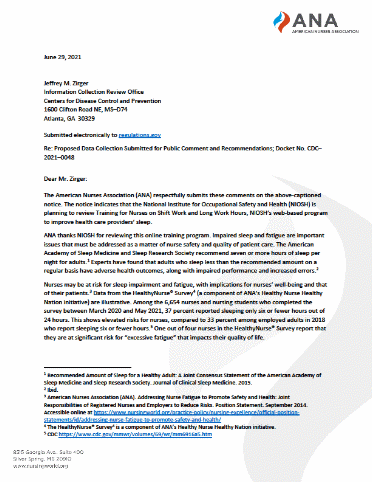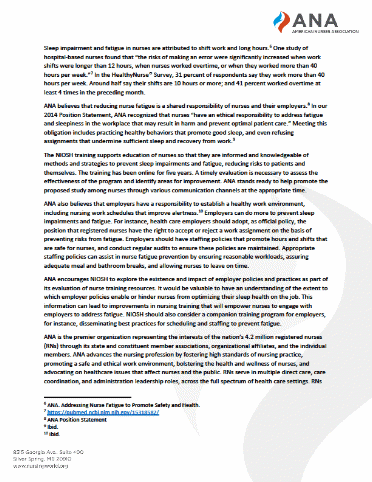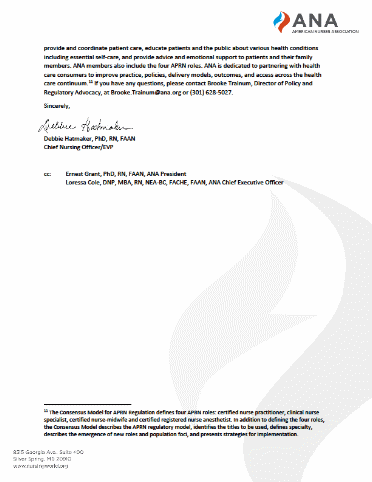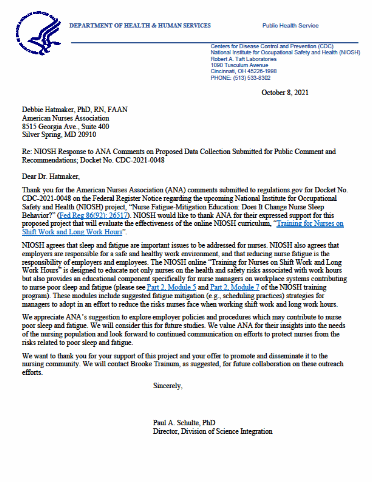Public Comments
Attachment F. Public Comments.docx
Nurse Fatigue-Mitigation Education: Does it Change Nurse Sleep Behavior?
Public Comments
OMB: 0920-1367
Attachment F. Public comments from the Federal Registry Notice, 60 Day
Comment 1 from Caitlyn Tiedemann (ID CDC-2021-0048-0002): Hello, as a bachelor-prepared registered nurse in the state of New York, I support this notice and would be excited to see this pass. Sleep is very subjective and can be difficult to assess. With that said, I believe the NIOSH did a great job designing the study to address the information they need to receive. It is essential the study keeps the open-ended questions that include the barriers of adoption. Potentially adding more or an open comment section at the end. This will help identify the subjective influences on the information they need to gather. This notice affects me at a personal level. I began my nursing career at the age of 22 in an intensive care unit working the overnight shift from 7 pm to 7 am. Fast forward three years later, I am burnout emotionally and physically. I was barely getting 4 hours of sleep a “night” and hardly was it ever uninterrupted (waking up prematurely constantly). I am not the only one who suffered this sleep deprivation. Almost all my fellow co-workers could attest to the lack of sleep and the overall negative impact on physical and emotional well-being. This has caused most of my co-workers to seek other positions. Creating new problems of short staff issues. Which further endangers the health and well-being of nurses and patients. There is a desperate need for this study to be conducted and for the strategies to be useful and effective. Nurses are getting burnout too early in their careers. In addition, these issues increase the risk of human errors and jeopardize patient safety. I assure the OMB will find the data and information selected is absolutely necessary and will provide practical use.
Response: We appreciate the comment but were unable to respond due to no contact information provided.
Comment 2 from Galvin Seamus (ID CDC-2021-0048-0004): I am making comment on the CDC proposed project on "Nurse fatigue-Mitigation Education: does it change nurse behaviour? The topic is Important to the writer since it is my lived experience. As a former night shift registered nurse, it is an important factor in safety for all.
Comment On CDC proposed Data collection on project titled “nurse Fatigue-Mitigation Education: Does
it change Nurse sleep Behavior.
It is well documented that achieving 6-8 hours of sleep in 24 hours is important to a person mental and
physical health. As a shift worker, nurses have attempted to adapt to an adjusted Circadian rhythm. As
we are human, not everybody easily adjusts to altered sleep hygiene.
It is a study worth conducting to evaluate the program, whose intent is to change Nurse sleep
behavior. The online resource “training for Nurses on Shift Work and Long Work Hours”, is available
for past 5 years. As in the nursing process, we assess, plan, intervene and EVALUATE the outcome. The
importance of this cannot be understated. By doing quantitative research in this area is important as,
research itself has become a hallmark of our data driven practice.
I question whether 50 respondents in study 1 and 2 will gather enough effect size, for inferential
statistics. Increasing the sample size will increase the power, to minimize the risk of making a type 2
error.
Will taking this class change behavior in a positive way. The outcome to reduce sick time, increase
retention, increase safety and patient satisfaction is our goal.
Response: We appreciate the comment but were unable to respond due to no contact information provided.
Comment 3
from Kirsten Dahlberg (ID CDC-2021-0048-0005): Swing
shift schedules in bedside nursing is all too common in the hospital
setting. As a previous ICU nurse, my first ICU position I was
required to work 12hr day and night shifts in the same week. This
drastic schedule adjustment took a physical toll, especially when
trying to learn a new role as an ICU nurse. Sleep deprived RNs with
less than a year of experience were left to care for high risks,
critically ill patients. Not only is this a safety concern for
patients, but a health concern for new grad RNs. Sleep deprivation
was part of being an ICU nurse. You were expected to get on board or
find another position. Even on my days off, my sleep was poor,
consistently waking up or having trouble falling asleep. Waking up
feeling unrested became the norm.
Once
I became a nurse practitioner, I returned to normal daytime work
hours, but my sleep patterns never returned to normal. It is
essential that we educate all nurses are how to get adequate sleep.
The risks to patients along with the longstanding health risks to
nurses is critical. Healthcare Organizations need to take
responsibility to protect their staff through proper education,
staffing and scheduling along with appropriate rest and compensation
for challenging shifts. I fully support this healthcare initiative,
the more research we can gain the better.
Response: We appreciate the comment but were unable to respond due to no contact information provided.
Comment 4 from the American Nurses Association (ID CDC-2021-0048-0003): Please see below



Response:

| File Type | application/vnd.openxmlformats-officedocument.wordprocessingml.document |
| Author | Hittle, Beverly (CDC/NIOSH/DSI/SSTRB) |
| File Modified | 0000-00-00 |
| File Created | 2022-06-24 |
© 2026 OMB.report | Privacy Policy